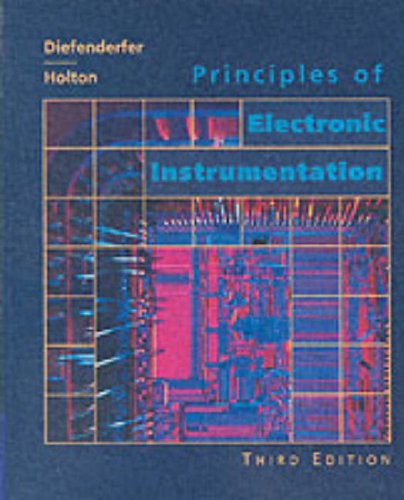 This student-oriented text familiarizes undergraduates with the electronics involved in scientific instrumentation and control systems for use in research and end products. Suitable for the one- or two-semester courses, the text emphasizes electronics applications, rather than the physics or engineering of a device. This makes the material suitable for students who need a fundamental knowledge of electronics for the laboratory or workplace. Manufacturers' data sheets for nearly every common component are gathered in a convenient appendix, making learning and applications much easier and providing students with a valuable reference tool.
This student-oriented text familiarizes undergraduates with the electronics involved in scientific instrumentation and control systems for use in research and end products. Suitable for the one- or two-semester courses, the text emphasizes electronics applications, rather than the physics or engineering of a device. This makes the material suitable for students who need a fundamental knowledge of electronics for the laboratory or workplace. Manufacturers' data sheets for nearly every common component are gathered in a convenient appendix, making learning and applications much easier and providing students with a valuable reference tool.
Customer Review: Do not buy this book!
Used this as the textbook for our basic college electronics course. It is riddled with major mistakes that made it impossible to trust any information. It is impossible to do many of the exercises without extensive knowledge not found in the book. The explanations are often difficult to follow. Definitely not for the novice. I would stay away from this book!
Customer Review: a very good book
I'm not sure why there are so many poor reviews of this book. I used the 2nd edition years ago and liked it - this 3rd edition continues to be very good.
It's approach is simple, clear & direct. The math is mostly algebra & trigonometry based with a bit of calculus thrown in here and there. This makes it very approachable especially if you don't have much experience with electronics. It's much clearer than Brophy ever was and more detailed than Faissler's book (Introduction to Modern Electronics).
I find many university level intro electronics books don't give enough motivation i.e. how you actually use the stuff. Electronics is, after all, an intensely PRACTICAL subject. This book throughout shows you where and how it relates to scientific applications. Chapter 7 on transducers and chapter 15 on noise are good intros to these areas in this regard.
dislikes: 30% (170/577 pages) of book is devoted to datasheets. Why I don't know. In every intro electronics course I've seen datasheets are rarely used. And just how likely is it that you'll need the ones in this book? - usually you'll need sheets for some oddball component in the lab portion of a course. These pages are a waste and should have been devoted to something else.
It should also have had end-of-chapter references for more advanced books. Glossary would have been nice too.
----------------------
if you want a more rigorous intro book use "Principles of Electronics: Analog and Digital" by Lloyd R. Fortney.
If you want more info on transducers, practical building and noise reduction techniques look at 1) "Electronics and Instrumentation for Scientists" by Malmstadt/Enke/Crouch, 2) "Measurement and Instrumentation Principles" 3rd Edition by Alan S. Morris, 3) "Signal Recovery from Noise in Electronic Instrumentation" by T.H. Wilmshurst, 4) "Electronic Instrument Handbook" by Clyde F. Coombs and 5) "Building Scientific Apparatus" by Moore/Davis/Coplan
Buy From Amazon
Tuesday, February 17, 2009
Principles of Electronic Instrumentation
Sunday, January 11, 2009
MP Principles and Applications of Electrical Engineering with Electronics Workbench Software with Upgraded Electronics Workbench Multisim Version 6.0
 Customer Review: awful awful book
Customer Review: awful awful book
This book is terrible. The text is impossible to actually find anything useful. The examples are just laughable. They are so far of a stretch for the material, honestly they usually are way way way too hard for any test or homework. The problems at the end of the chapter always have tons of errors. Our teacher corrected the book over and over. I'm sure the only reason we used it is because he is a professor at my school. I don't care what Rizzoni has achieved, he can't write books to save his life.
Customer Review: Content is good, but many errors
So far I read through the first few chapters of "Principles and Applications of Electrical Engineering" and was pleased with how well written and straightforward the text is. However, the first chapter is really nothing more than a sales pitch for the Ford Escape hybrid and some land speed record electric vehicle. There are also numerous errors in the figures printed throughout the text, many being entirely different from what the text suggests they should be. Despite everything, my professor has assured me that there really aren't any better texts for an undergraduate course at the junior level.
Buy From Amazon
